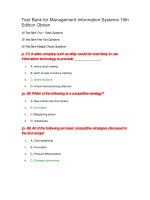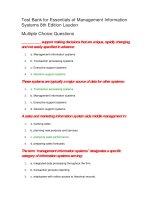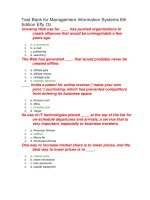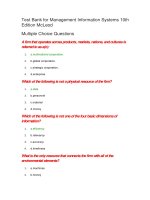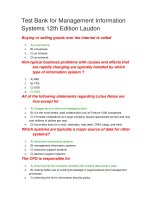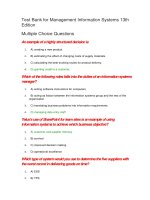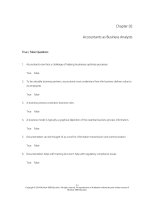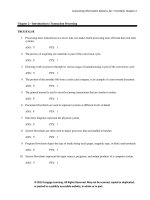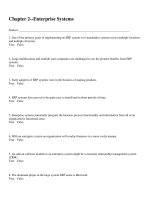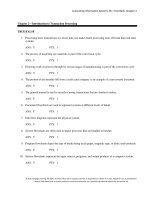Management information systems 7th edition sousa test bank
Bạn đang xem bản rút gọn của tài liệu. Xem và tải ngay bản đầy đủ của tài liệu tại đây (280.91 KB, 8 trang )
CHAPTER 2: STRATEGIC USES OF INFORMATION SYSTEMS
1. Strategic information systems are defined by their technical features per se, and not by how they are used.
a. True
b. False
ANSWER: False
2. Practically any mobile-based system that gives a company competitive advantage is a strategic information system.
a. True
b. False
ANSWER: True
3. Companies raise barriers to entrants by obtaining legal protection of intellectual property.
a. True
b. False
ANSWER: True
4. The larger the number of companies competing within an industry, the better off each company is.
a. True
b. False
ANSWER: False
5. Switching costs can be explicit or implicit.
a. True
b. False
ANSWER: True
6. Instead of differentiating a product or service, an organization can add to the product or service to increase its value
to the consumer.
a. True
b. False
ANSWER: True
7. An alliance can be created to enable customers to use the same technology for purchases from different companies.
a. True
b. False
ANSWER: True
8. A barrier to potential new market entrants is the high expense of entering the particular market.
a. True
b. False
ANSWER: True
© 2015 Cengage Learning. All Rights Reserved. May not be scanned, copied or duplicated, or posted to a publicly accessible website, in whole or in part.
Chapter 2: Strategic Uses of Information Systems
9. One way to lock in buyers in a free market is to create a situation in which customers fear high switching costs.
a. True
b. False
ANSWER: True
10. A firm gains bargaining power with a supplier when the firm has many competitors.
a. True
b. False
ANSWER: False
11. The reengineering process makes it possible to determine how much each change contributed to the organization’s
improved position.
a. True
b. False
ANSWER: False
12. In a highly competitive industry that traditionally has had a narrow profit margin, JetBlue managed to gain
strategic advantage by reducing cost and therefore reducing the price to the customer.
a. True
b. False
ANSWER: True
13. For an information system to be an strategic information, one of the conditions is that the information system must
serve an organizational goal rather than simply provide information.
a. True
b. False
ANSWER: True
14. The goal of reengineering is to gain small incremental cost savings.
a. True
b. False
ANSWER: False
15. Being on the bleeding edge can mean that implementation costs are significantly higher than anticipated.
a. True
b. False
ANSWER: True
© 2015 Cengage Learning. All Rights Reserved. May not be scanned, copied or duplicated, or posted to a publicly accessible website, in whole or in part.
Chapter 2: Strategic Uses of Information Systems
16. The word “strategy” originates from the Greek word strategos, meaning “
a. ahead
b. general
c. task
.”
d. vision
ANSWER: b
17. In a
, a market rarely remains the domain of one organization for long; thus, competition ensues
almost immediately.
a. planned economy
b. mixed society
c. free-enterprise society
d. command economy
ANSWER: c
18. Which of the following statements is true of explicit switching costs?
a. Explicit switching costs involve a penalty levied for terminating a deal or contract.
b. Explicit switching costs are recurring in nature.
c. Explicit switching costs are variable in nature.
d. Explicit switching costs are concerned with the indirect costs in time and money.
ANSWER: a
19. One way to increase market share is to lower prices, and the best way to lower prices is to
a. reduce costs
b. outsource jobs
c. promote self-training d. update to latest technologies
.
ANSWER: a
20. Which of the following is considered a strategic advantage of the first-mover?
a. Technological literacy b. Superior brand name
c. High market value
d. Guaranteed long-term success
ANSWER: b
21. Which of the following patents does Priceline.com hold that prevents competitors from entering its business space?
a. One-click online purchasing b. Half-price product exchange plan
c. Online reverse auctioning
d. Zero processing fee
ANSWER: c
22.
are expenses incurred when a customer stops buying a product or service from one business and starts
buying it from another.
a. Marginal costs
b. Standard costs
c. Opportunity costs
d. Switching costs
ANSWER: d
© 2015 Cengage Learning. All Rights Reserved. May not be scanned, copied or duplicated, or posted to a publicly accessible website, in whole or in part.
Chapter 2: Strategic Uses of Information Systems
23. A
is a body of clients that is large enough to attract many other clients.
a. client subsystem
b. client set
c. critical alliance
d. critical mass
ANSWER: d
24.
refers to the competitive advantage that a company can achieve by persuading customers that its product or
service is better than its competitors'.
a. Product segmentation
b. Product differentiation
c. Product validation
d. Product specification
ANSWER: b
25.
refers to an organization's initiative of adding to a product or service to increase its value to the consumer.
a. Scaling value
b. Enhancement of existing products or services
c. Appreciation of existing products or services
d. Incrementing value
ANSWER: b
26.
provide customers with cheaper combined service and the convenience of one-stop shopping.
a. Alliances
b. Prototypes
c. Automations
d. Parameters
ANSWER: a
27. On the web, an example of alliances is a(n)
.
a. affiliate program
b. online analytical agreement
c. object-oriented program
d. progressive task agreement
ANSWER: a
28. Which of the following is a result of forming strategic alliances?
a. Organizations do not enjoy synergy.
b. The combined service is more expensive.
c. One-stop shopping is rendered inconvenient. d. The same technology is used.
ANSWER: d
29. Which of the following conditions must exist for an information system to be a strategic information system?
a. The information system must simply provide information.
c. The organization's top management must be involved only during the implementation stage.
b. The organization’s information system unit must only work with managers of the same unit.
d. The information system must serve an organizational goal.
ANSWER: d
© 2015 Cengage Learning. All Rights Reserved. May not be scanned, copied or duplicated, or posted to a publicly accessible website, in whole or in part.
Chapter 2: Strategic Uses of Information Systems
30.
involves adoption of new machinery and elimination of management layers.
a. Prototyping b. Reengineering
c. Debugging
d. Offshoring
ANSWER: b
31. A system can only help a company sustain competitive advantage if the company continuously modifies and
enhances it, creating a(n)
for competitors.
a. alliance
b. bleeding edge
c. standard
d. moving target
ANSWER: d
32.
use physical characteristics of people, such as fingerprints and retina scans, for authentication and access to
physical places and online information systems.
a. Access codes
b. Biometrics
c. Object codes
d. Compilers
ANSWER: b
33. JetBlue obtained the strategic advantage of the
fast databases, VoIP, and a slick website.
a. first mover
b. late mover
c. source code
d. object code
by implementing the latest available technologies of
ANSWER: b
34. The most important metric in the airline industry is
, which is how much it costs to fly a passenger one mile
of the journey.
a. cost per available seat-mile (CASM)
b. cost per available seat (CAS)
c. cost per mile (CM)
d. cost per hour (CH)
ANSWER: a
35. In a highly competitive industry that traditionally has had a narrow profit margin, JetBlue managed to gain
strategic advantage by
.
a. reducing cost
b. hiring new employees
c. increasing the seating capacity
d. reducing the number of flights
ANSWER: a
36. A company achieves
by using strategy to maximize its strengths, resulting in a competitive advantage.
ANSWER: strategic advantage
37. The essence of strategy is innovation, so
tried before.
is often gained when an organization tries a strategy that no one has
ANSWER: competitive advantage
© 2015 Cengage Learning. All Rights Reserved. May not be scanned, copied or duplicated, or posted to a publicly accessible website, in whole or in part.
Chapter 2: Strategic Uses of Information Systems
38. Companies that are first to adopt advanced systems that reduce labor enjoy
lag behind.
for as long as their competitors
ANSWER: competitive advantage
39. Indirect costs in time and money spent adjusting to a new product that competes with the old is an example
of implicit
.
ANSWER: switching costs
40.
are expenses incurred when a customer stops buying a product or service from one business and starts
buying it from another.
ANSWER: Switching costs
41. eBay’s success demonstrates the strategic advantage of the
product or service.
, an organization that is the first to offer a new
ANSWER: first mover
42.
provide draws for customers that include combined services that are cheaper.
ANSWER: Alliances
43. Organizations can achieve competitive advantage if they are powerful enough to
operation or buyers to their product.
suppliers to their mode of
ANSWER: lock in
44.
combine ideas for making potentially winning business decisions and ideas for harnessing information
technology to implement the decisions.
ANSWER: Strategic information systems SISs
Strategic information systems (SISs)
45. The goal of
is not to gain small incremental cost savings, but to achieve great efficiency leaps—of 100 percent
and even 1000 percent.
ANSWER: reengineering
46. In an environment where most information technology is available to all,
that are originally developed to
create a strategic advantage quickly become an expected standard business practice.
ANSWER: SISs
strategic information systems strategic
information systems (SISs)
47. Brand-name success is a perfect example of
.
ANSWER: product differentiation
© 2015 Cengage Learning. All Rights Reserved. May not be scanned, copied or duplicated, or posted to a publicly accessible website, in whole or in part.
Chapter 2: Strategic Uses of Information Systems
48.
is software that the developer gives to potential adopters for trial use.
ANSWER: Beta software
49. Information systems that help seize opportunities are called
.
ANSWER: strategic information systems
SISs
strategic information systems (SISs)
50. Ford created a joint venture with General Motors Corp. and DaimlerChrysler to establish
, a website that
serves as an electronic market for parts suppliers who can bid online on requests for proposals posted by the
automakers.
ANSWER: Covisint
51. When failure occurs because an organization tries to be on the technological leading edge, observers call it the
_____.
ANSWER: bleeding edge
52. List eight basic initiatives that companies can use to gain competitive advantage.
ANSWER: Consider competitive advantage in terms of a for-profit company, whose major goal is to maximize
profits by lowering costs and increasing revenue. A for-profit company achieves competitive
advantage when its profits increase significantly, most commonly through increased market share.
Eight basic initiatives that can be used to gain competitive advantage are: reduce costs, raise barriers to
market entrants, establish high switching costs, create new products or services, differentiate products
or services, enhance products or services, establish alliances, and lock in suppliers or buyers. It is
important to understand that the eight listed are the most common, but not the only, types of business
strategy an organization can pursue. It is also important to understand that strategic moves often
consist of a combination of two or more of these initiatives and other steps. The essence of strategy is
innovation, so competitive advantage is often gained when an organization tries a strategy that no one
has tried before.
53. Give an example of companies establishing high switching costs to gain competitive advantage.
ANSWER: Manufacturers of laser and ink-jet printers sell their printers at cost or below cost. However, once you
purchase a printer, you must replace a depleted ink or toner cartridge with one that the printer
manufacturer sells, or take a risk with other cartridges whose quality is often low. As a cartridge
customer, you face high costs if you consider switching to another brand. Even if comparable
cartridges from another manufacturer are less expensive, you cannot use them; and if you decide to use
those cartridges, you will lose your investment in the printer, because you must buy a new one. Thus,
establishing high switching costs often locks in customers. Locking in customers by any means is a
way to accomplish a strategic advantage.
© 2015 Cengage Learning. All Rights Reserved. May not be scanned, copied or duplicated, or posted to a publicly accessible website, in whole or in part.
Chapter 2: Strategic Uses of Information Systems
54. Provide an example of a company using the lock in buyers strategy successfully.
ANSWER: Adobe gives away its Acrobat Reader software, an application that lets web surfers open and read
documents created using different computers running different operating systems, such as various
versions of Windows, the Mac operating system, and UNIX. When the Reader user base became large
enough, organizations and individuals found it economically justifiable to purchase and use the full
Acrobat application (the application used to create the documents) and related applications. Using this
strategy put Adobe’s PDF (portable data format) standard in an unrivaled position.
55. Why would you consider competitive advantage as a moving target?
ANSWER: Competitive advantage is often short-lived. In time, competitors imitate the leader, and the advantage
diminishes. So, the quest for innovative strategies must be dynamic. Corporations must continuously
contemplate new ways to use information technology to their advantage. In a way, companies’
jockeying for the latest competitive advantage is a lot like an arms race. Side A develops an advanced
weapon, then side B develops a similar weapon that terminates the advantage of side A, and so on.
56. Why is JetBlue considered to have gained a late mover advantage?
ANSWER: Some observers cite the fact that JetBlue is a late competitor as an important factor in its success. The
company is not burdened with antiquated information systems, or as IT professionals like to call them,
legacy systems. This allowed its CIO to implement the latest available technologies: fast databases,
VoIP, a slick website, laptop computers with the latest algorithms for fast calculation of routes and
loads in the cockpit, and other technologies. This situation illustrates the strategic advantage of the late
mover.
© 2015 Cengage Learning. All Rights Reserved. May not be scanned, copied or duplicated, or posted to a publicly accessible website, in whole or in part.
